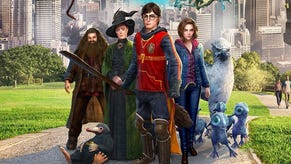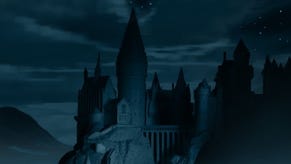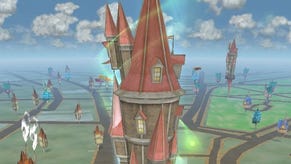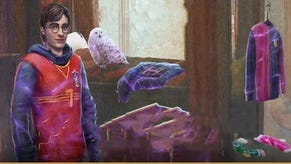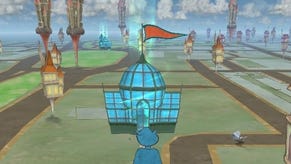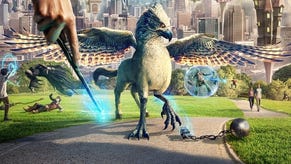Why Harry Potter: Wizards Unite doesn't place you in House teams
Get schooled.
On yet another swelteringly hot LA afternoon, I found myself wandering around a grey town with snowy rooftops and a pint of dubiously fizzy beer in hand. Why? It was the launch event for Niantic's Pokémon Go follow-up, Harry Potter: Wizards Unite, which following a beta in Australia and New Zealand, has finally been given a US and UK release date. That's happening pretty soon, in fact - this Friday, 21st June.
Much of the gameplay on offer was close to what we'd seen in our previous Harry Potter: Wizards Unite hands-on back in March - and some core aspects of the game (such as fortresses and inn regeneration - the latter crucial for spell energy) remained frustratingly locked. But before I took the title for a test drive, I sat down with WB Games San Francisco executive producer Mary Casey, who I asked about skill trees, improving on Pokémon Go's framework, and most importantly, why inter-House competition isn't a focus of the game.
Will the game be released in a similar regional rollout to Pokémon Go?
Casey: The game is currently live in New Zealand and Australia, on the 21st the UK and US will join those two territories, and then we'll do a regional roll-out from that point forward.
Do you know which regions will be next after that?
Casey: We haven't announced our regional roll-out plan at the moment, but we're really excited to bring the game to the UK and the US on Friday.
The other exciting news is the announcement of a Pokémon Go Fest-style event, is that going to be in the US or Europe to start?
Casey: We haven't announced the location for the event as of now, but we're super excited about it, obviously Niantic are pioneers of this type of event, fusing the real world and the game world together, and so everyone on the teams are absolutely stoked.
Is that going to function very similarly to how Fest works? For instance, exclusives and various goodies for people who visit?
Casey: We're not releasing any details of the festival right now, but I can reassure you that anyone that goes will really have a brilliant time, and if anyone sees me out there please come and say hi, and thank you so much for supporting the game.
Could you explain a little bit about how monetisation is going to work? There's obviously going to be customisation, but how will the monetisation impact the gameplay and how are you ensuring it's fair?
Casey: Absolutely, so the game is free to play and free to download, there are microtransactions within the game, we have been really diligent about making everything in the game is accessible to everybody, and that the game remains fair and balanced for all players. If players did want to potentially speed up some parts of the game, then they would be able to do that by making some microtransactional purchases throughout the game, but game balance-wise, we ensure that the game remains playable to all without any of the purchases.
So to be clear, will all items in the shop that affect gameplay be earnable through playing the game?
Casey: Everything in the game is earnable.
Are there any elements of this game that can be played at home? With Pokémon Go you basically have to be out and about, but some people have said they'd like a bit more to do while they're just sat down.
Casey: Yeah, absolutely, I do love my sofa. Obviously there's the customisation feature, so feel free to take a really great selfie, but there's also things like potion brewing, which can be done anywhere at any time, also your portkeys once they're warped can be opened in the comfort of your own home, so we've really focused on the core tenets of the Niantic real world platform which is getting out there, exercise, out in the fresh air, exploring the neighbourhood, at the same time there are some touchpoints of different things you can do when you're not able to get out.
Could you explain a bit more about how potions work and potion brewing? Some people in the New Zealand beta were asking about invigoration draughts and sharpening draughts (quite specific, I know).
Casey: So there are a number of different potions throughout the game, you brew potions by collecting ingredients you find throughout the world, and in our latest update you'll also be able to go through greenhouses and collect ingredients, and also grow ingredients using seeds and water, so if you really needed a certain item you'd be able to grow the item and collect it. And then everybody who was around that greenhouse would be able to collect that item as well. So once you have everything you need, you put them in a cauldron, and then you take some time to brew. Feel free to interact with that potion while it's brewing, maybe shake your phone, give it a little stir, all sorts of different effects can occur if you're doing that. Once the potion's brewed, depending on what type of potion it is, it can be used at different stages throughout the game. Many potions give you bonuses to other things you're doing, so maybe an XP bonus, or a health bonus during a fortress battle, or in an encounter so straight one on one encounters during a trace of magic, you may be able to either stop the confoundable from whisking the foundable away, or to lower the difficulty of that as well. So if you go into the potion brewing section on the right hand side, there's a whole list of all the potions, what they do, what the ingredients are, and a little bit of lore around each of the ingredients, so if you're a bit of a botanics nerd then there's plenty in there for you to enjoy.
If you're a Hufflepuff, I guess!
Casey: Yeah! There's nothing wrong with being a Hufflepuff.
Hufflepuffs get a bad rap. Have you found a way to balance big cities with small towns? As that's something a lot of Pokémon Go players have found a problem.
Casey: Absolutely, it's something we're really focused on, and I just want to give a massive shout-out to our New Zealand and Australia players, because their feedback has really informed the way that points of interest are distributed on the map, ingredients are distributed on the map, and traces are. We really hope that everyone who plays the game, no matter where they are, has a balanced experience, and we're always soliciting feedback on that type of thing. So yeah, I'm hoping that, I believe that we're in a really great place and everyone will get the experience they want.
Could you name any specific mechanics designed to help tackle the problem?
Casey: Yeah, so one of the things we designed for this game was something called the landmark feature, what the landmarks do is essentially take real world points of interest and create areas around there where different types of traces will be more common. So what that will mean is essentially some places in urban areas will be dense in some types of foundables, and some places in suburban or rural areas will find other traces more common. So with that we encourage people to explore, to go to different areas, but also it doesn't feel like the haves and the have nots. Everyone has something they can encounter and enjoy, cast spells against, brew.
You've probably had this question a lot, but I'm guessing the decision to not have Houses was made pretty early on, and I was wondering why you decided not to go for House competition?
Casey: So Houses for me are probably one of the most iconic but intrinsic parts of the Harry Potter universe, I'm a Slytherin born and bred, tried true, there's no way that I would swap to another house. But at the same time, I want to be able to play with you! And I want to be able to play with that guy over there, and with my son, my husband, my nieces, and we're all different houses. We all have a part to play, we all have a role to play, and that's really important. So Harry Potter to me is really about bringing diversity, diverse people with diverse skillsets together, Harry's friends were - obviously Hermione and Ron had very different skill sets, but people like Neville and Luna as well, we didn't want to exclude them to another team, we wanted to bring them together. And so, we made the decision to not go with competitive houses, and allow people with different houses to play together cooperatively and to overcome the calamity.
I guess there's a lot of cooperation - would you say there are any elements which are competitive in HPWU?
Casey: So we're really heavy on cooperation, we feel that's a huge part of the books, but obviously we are consistently involved in the game.
So with skill trees, how far can people customise their builds? How varied are the different builds people can create?
Casey: Very varied - so they're designed to really support different styles of play, different builds so even if you're a professor and I'm a professor, we may have taken very different choices, and be heavily one way or another. You can also be a little bit all-round, and those start to kick in further and further you get down the skills tree, and our aim is to really expand both the challenges and the skill tree month on month on month, and so I hope people find some really fun, cool, interesting, different builds to invest in.
Is there any benefit to min-maxing the skill trees or doing balance? Can you put skills in the different classes?
Casey: Once you've invested in a class - auror, professor or magizoologist, you can swap and invest in a new class. You are starting from scratch from the new class, but your progress on your previous class is not taken away, so if you get three quarters down the progression tree and then you switch to auror, you do start from zero at auror, but any time you can swap to professor and you'll be down that skills tree. So it's not an either or, it's more about using your resources in the way that you feel like you can deep on one, you can go wide on all three, it's about you, your individual playstyle and what you feel comfortable with.
With the story, this is going to be an evolving narrative across the years, I was wondering how closely you're going to stick with canon Harry Potter - as JK Rowling isn't approving it for the games?
Casey: Narrative is built for the game, but we feel it is an authentic narrative, the wizarding world has certain rules about the way things work, the way things are set up, what you can and can't do, and we follow those absolutely religiously. But obviously the story we're writing is unique to Wizards Unite.
Pokémon Go came in with an obvious formula - Pokémon was already a game, do you worry that with HPWU it's a bit more obtuse, it might be more difficult for players to get to grips with it?
Casey: Harry Potter is a complex, interesting, wonderful franchise - and it means different things to different people, and those storylines are not all simple, they're not all straightforward or always clear. I think in this game we wanted to make sure we created something that felt true to that, that we didn't go with the simplest possible thing we could do, at times maybe there's been some trade-off there, but I think what we've done is created something that feels like it came from the Harry Potter universe, and to me that was the number one and most important thing that we did. And I hope people really want to invest in the world we created, enjoy the different features, and different things going on, and that they'll find the kind of joy and care and commitment we've had to the world in the game.





